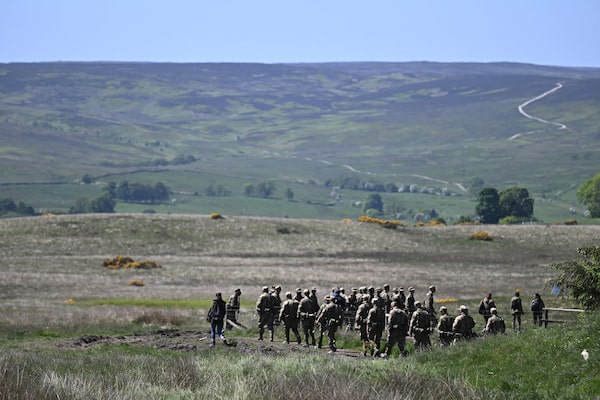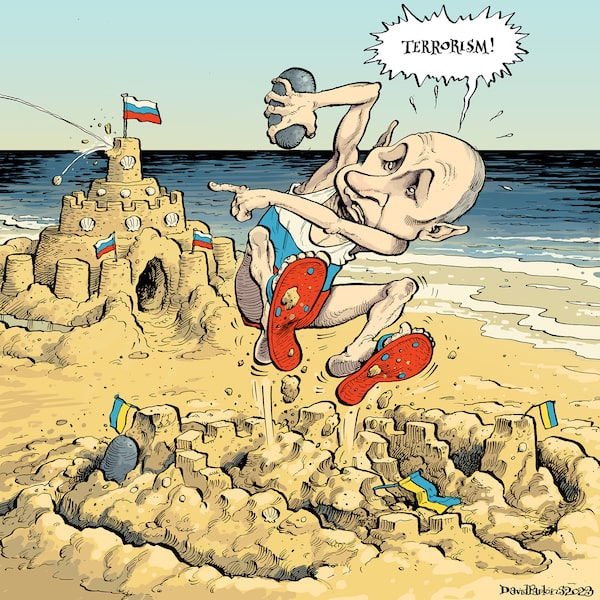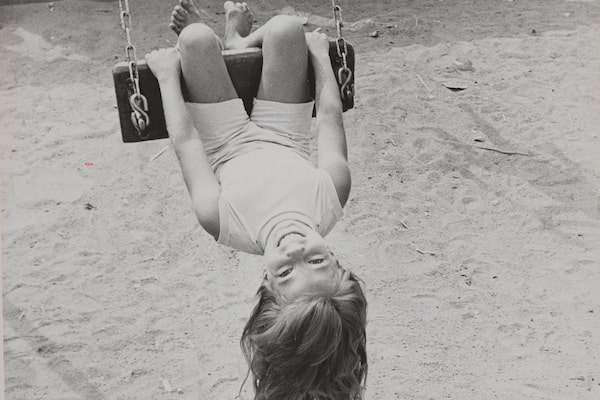Good morning,
Resources are strained for the thousands of provincial firefighters who are battling a devastating start to wildfire season, with hundreds of Canadian soldiers and foreign firefighters scrambling to reinforce stretched units in Nova Scotia, Alberta and Quebec, where thousands have been forced from their homes.
So far this season, 10 times the average amount of terrain has been scorched, compared with the past decade, renewing calls for a federal solution to supplement provincial and international firefighting resources.
To date, 566 firefighters have travelled between provinces this year to help other jurisdictions, and another 443 firefighters and other trained experts have come to Canada from Australia, New Zealand and the United States, with waterbombers and helicopters from Montana deployed in Nova Scotia Sunday. Another 200 firefighters from South Africa deployed to Alberta Sunday and Quebec’s government said about 200 Canadian Armed Forces members were working in that province. Quebec is also training 200 more firefighters to join their efforts and 200 provincial police officers are now helping fight 35 blazes.
Smoke billows upwards from a planned ignition by firefighters tackling the Donnie Creek Complex wildfire south of Fort Nelson, British Columbia, June 3, 2023.B.C. WILDFIRE SERVICE/Reuters
This is the daily Morning Update newsletter. If you’re reading this on the web, or it was forwarded to you from someone else, you can sign up for Morning Update and more than 20 other Globe newsletters on our newsletter sign-up page.
Ukraine’s military pleads for silence around long-awaited counteroffensive: ‘Plans love silence’
For weeks, Ukrainian officials have been caught between trying to assure their citizens that a counterattack is indeed coming, and trying to tamp down speculation that could help Russia prepare its defences.
Now that conditions appear to be in place for a Ukrainian attack that the country’s leadership hopes will drive Russian troops out of at least part of the roughly 15 per cent of Ukrainian territory they currently occupy, Ukraine’s military is asking for silence, in an effort to discourage leaks as the country prepares its counteroffensive.

Ukrainian soldiers take part in trench warfare exercises at a British Army military base in Northern England on June 2, 2023.PAUL ELLIS/AFP/Getty Images
First Nations chiefs say funds to provide policing in communities rapidly dwindling
First Nations chiefs in northern Ontario are declaring states of emergency, fearing that a public-security vacuum will engulf the region’s reserves this summer should Indigenous police officers be forced off of work over a lack of funding.
Indigenous police forces have reached an impasse in negotiations with the federal government over its role in administering the First Nations and Inuit Policing Program (FNIPP), a 30-year-old federal-provincial cost-sharing policy that has created nearly 40 Indigenous police forces across Canada.
Now, these police forces are seeking to negotiate expanded versions of past agreements that could potentially cover policing costs like legal fees or setting up specialized squads. The federal government’s position, however, is that it will not discuss taking on such added costs and that it has no mechanisms to move money to reserves that currently do not have any formal agreements in place because the previous ones have expired.
Peace tower on Parliament Hill in Ottawa on June 1, 2023.Sean Kilpatrick/The Canadian Press
Groups in Canada and England are trying to revitalize the dying sport of lawn bowling
Lawn bowling, a once-popular summer pastime, has fallen on hard times in recent years as greens close, players age and interest dwindles.
Now, organizers in Canada and England are seeking to revive the sport and broaden its appeal by introducing new up-tempo versions of the game, starting community leagues, and easing back on traditions so much that some players would be allowed to bowl barefoot or while holding a beer.
People lawn bowl at Pelton Fell Bowling Club in Pelton, Britain, May 31, 2023.LEE SMITH/Reuters
Got a news tip that you’d like us to look into? E-mail us at tips@globeandmail.com Need to share documents securely? Reach out via SecureDrop
Also on our radar
Quebec community mourns victims of fishing accident, including four children: A Quebec community is mourning the weekend deaths of five people, including a father and his two young sons, who were swept away by the rising tide while fishing near Portneuf-sur-Mer.
No longer silent, more victims of sexual violence fight publication bans imposed in their names: When abusers go to trial, survivors who want to tell people what happened are often thwarted by court orders that are costly and time-consuming to undo. These women want to change that.
Bank of Canada rate hike a possibility this week, economists say: For the first time in months, the possibility of another Bank of Canada interest-rate hike appears to be on the table this week.
Eldorado Gold latest miner to shore up flagging equity financing market: Vancouver-based Eldorado tapped BMO Capital Markets and National Bank Financial last week to lead a bought deal share offering worth between $135-million and $155-million, depending on whether an overallotment option is exercised.
Laid-off tech workers find stability in traditional industries: Laid-off tech workers are increasingly moving into mainstream industries such as banking as they trade the excitement of startups for the stability of long-established companies in traditional sectors.
Morning markets
Oil jumps on Saudi vow to cut output: World shares rose and the U.S. dollar firmed on Monday as investors bet the Federal Reserve would pause its rate hikes this month after a mostly encouraging U.S. jobs report, while oil prices jumped after Saudi Arabia pledged big output cuts. Around 5:30 a.m. ET, Britain’s FTSE 100 was up 0.56 per cent. Germany’s DAX added 0.03 per cent while France’s CAC 40 slid 0.12 per cent. In Asia, Japan’s Nikkei finished up 2.2 per cent. Hong Kong’s Hang Seng added 0.84 per cent. New York futures were muted. The Canadian dollar was relatively steady at 74.42 US cents.
What everyone’s talking about
Case for another Bank of Canada rate hike built on wrong indicators
“Market pundits and economic commentators have taken two key economic releases in the past couple of weeks: a surprising uptick in the April inflation rate, followed by surprisingly strong first-quarter gross domestic product growth. They have concluded that the economy is drifting off the Bank of Canada’s desired course.” – David Parkinson
The ‘15-minute city’ idea is key to solving Canada’s housing crisis
“In the past couple of months, this urban planning concept has taken over headlines and sparked fierce debate. It holds that all essential services and amenities such as housing, schools, health care, parks and work should be located within a 15-minute walk or bike ride. This is the key to tackling the housing and affordability crisis in Canada.” – Christopher Alexander
Today’s editorial cartoon

David Parkins/The Globe and Mail
Living better
Home and garden news: The new ‘it’ colour is out, an electronic composter and a gardener’s must-read book list
The Globe and Mail details this month’s design and garden news, buys and curiosities.
Moment in time: Playgrounds as they used to be

Swinging in the Trefann St. park: a grim, messy playground for children.The Globe and Mail
For more than 100 years, photographers and photo editors working for The Globe and Mail have preserved an extraordinary collection of news photography. Every Monday, The Globe features one of these images. This month, we’re looking at playgrounds.
The Minoans are credited with inventing the swing in about 1450 BCE. Ancient Egyptians played with marbles. So children have been able to amuse themselves for thousands of years. However, formalized playgrounds, in which children can develop social, cognitive and physical skills, have been around for less than 200 years. Their invention is attributed to a 19th-century German educator, Friedrich Froebel, who also created kindergarten. He believed that a child’s development depended on designated places to play. It was an idea that was slow to catch on. In Toronto, children’s playgrounds became more popular at the turn of the last century – with swings, teeter-totters, slides and large possibly dangerous spinners, sometimes known as carousels or roundabouts, on which children sat, spun themselves around ever faster, became dizzy, flew off, squealed and got back on again. In the timeless photo above, by The Globe and Mail’s Franz Maier in 1969, children know the only important thing in a playground is to have fun. Philip King.
Read today's horoscopes. Enjoy today's puzzles.
If you’d like to receive this newsletter by e-mail every weekday morning, go here to sign up. If you have any feedback, send us a note.